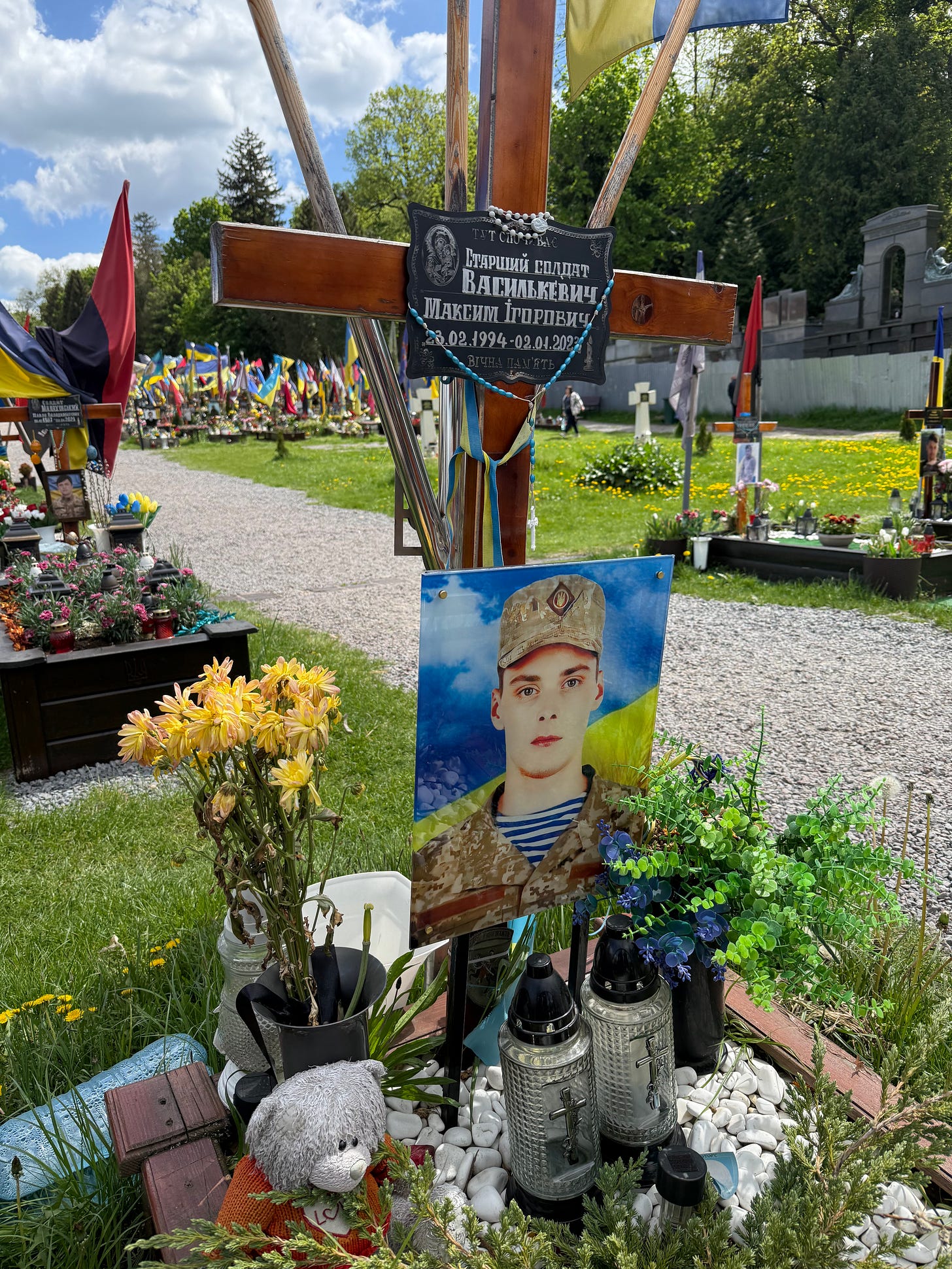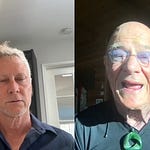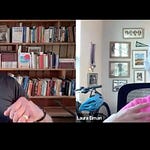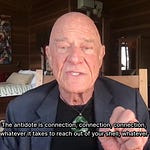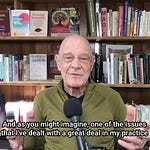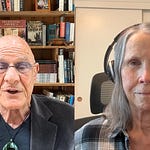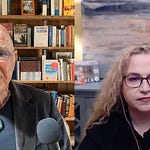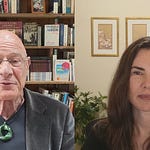Dear friends,
I've just returned from one of the most emotional and impactful journeys of my 86 years—a mission to Ukraine to train medical professionals in psychedelic-assisted therapy for soldiers suffering from PTSD. In this special preview before Tuesday's full interview with Dr. Rick Doblin, founder of MAPS (the Multidisciplinary Association for Psychedelic Studies), I want to share what we witnessed together in a country fighting not just for territory, but for its very existence as a democracy.
At Rick’s invitation, I traveled from San Francisco to Boston, then to Amsterdam, Krakow, and finally to Lviv, Ukraine. Our purpose was critical: train local Ukrainian clinicians to use MDMA-assisted therapy to treat the severe psychological trauma their soldiers are experiencing on the frontlines.
Despite MDMA remaining illegal in Ukraine due to laws inherited from Russia, 55 dedicated professionals from across the country gathered for our training—many from cities actively under bombardment. As we conducted our sessions, air raid sirens would periodically force evacuations. During one class, an emergency alert interrupted our lecture as nearby areas were being bombed.
What struck me most was how Ukrainians have "normalized fear." While buildings shake and children hide, daily life somehow continues. Our training participants would calmly check their phones for updates on their hometowns, then return to taking notes about therapeutic protocols. Their resilience is both inspiring and heartbreaking.
One participant told me: "We don't have the luxury of postponing our learning until peacetime. Our soldiers need help now."
Of all my experiences in Ukraine, one visit will remain seared in my memory forever. Our hosts took us to a cemetery for fallen soldiers—a sea of fresh graves, each marked with Ukrainian flags and a photograph of the young man who died defending his country.
"We don't have the luxury of postponing our learning until peacetime. Our soldiers need help now."
Standing before these graves, seeing the faces of these young boys needlessly killed, was absolutely shredding. It cut deep into my soul. As I describe in the interview, I walked into that cemetery and began crying. These weren't anonymous casualties—they were sons, brothers, and fathers whose lives had been abruptly ended. Their photographs captured smiles, hopes, and dreams now forever unfulfilled.
Beyond the cemetery, I visited both a hyperbaric chamber facility and a Superhumans center where they manufacture prosthetic limbs. The scale of their operation revealed the hidden toll of this conflict—I saw soldiers being fitted for robotic arms, and even witnessed a man with no arms or legs, just a torso and head. The courage and spirit these wounded warriors showed was both heartbreaking and inspiring.
Throughout my visit, I wore a traditional Ukrainian shirt given to me by our hosts. It was a small gesture of solidarity with a people who showed me nothing but warmth and determination despite their circumstances.
As I boarded my return flight, I left behind memories of gracious, loving people fighting to keep their country free from the grip of authoritarianism. I left behind their hearts, their hard work, and their unwavering commitment to democracy.
But I also brought something back—a renewed appreciation for what we often take for granted in America, and a determination to continue supporting Ukrainian clinicians remotely as they work to heal the psychological wounds of war.
On Tuesday's interview, Rick and I discuss the specific plans for Ukraine's three-phase training program: the initial six-day training we just completed, the next phase where therapists would experience MDMA themselves in a therapeutic setting, and finally, working with PTSD patients under supervision. We also explore the potential for group therapy—something I'm personally interested in returning to teach.
While government regulations currently prevent the legal use of MDMA for PTSD treatment in Ukraine, our training prepares these clinicians for the moment such treatments become possible. In the meantime, we've established channels to provide ongoing consultation and support as they work with conventional approaches.
If you're moved to help this cause, I encourage you to support MAPS (Multidisciplinary Association for Psychedelic Studies), the organization making this vital work possible. Their upcoming MAPS Psychedelic Science conference in June will feature discussions about international humanitarian efforts like our work in Ukraine. As Rick mentions in our conversation, the conference will include speakers like former Texas Governor Rick Perry and several current members of Congress, showing the remarkable bipartisan support for psychedelic science.
As always, I remain committed to expanding consciousness and healing trauma wherever it exists. This experience in Ukraine only strengthens my resolve to continue this work, even as I enter my 87th year.
Join us on Tuesday for the full conversation with Dr. Rick Doblin, where we also discuss the deeper meaning of our work in Ukraine and how, as Rick and I reflect, we too are living in a kind of war zone here in America—with 72% living paycheck to paycheck, widespread anxiety and depression, and a deeply divided country.
Golden light,
Richard Louis Miller, M.A., Ph.D.
Links & Resources
Work with Me
After six decades as a practicing psychotherapist, I'm offering limited opportunities to work directly with me. I bring extensive experience addressing anxiety, depression, trauma, relationship challenges, addiction, and psychedelic integration.
My approach focuses on practical mind control techniques that allow you to direct your thoughts and emotions rather than being directed by them. To learn more about working together, contact me here or email DrRichardLMiller@gmail.com with subject line "Contact Request."
Now Available: Psychedelic Medicine at the End of Life
You can now order my latest book, Psychedelic Medicine at the End of Life: Dying Without Fear. This work represents a culmination of my decades-long journey as a clinical psychologist, exploring how psychedelics can transform our approach to death and dying.
The book examines how substances like LSD, MDMA, and psilocybin can be powerful tools in confronting our fears of mortality, ultimately leading to richer, more fulfilling lives. I'm honored to include insights from renowned experts in the field, as well as my own experiences.
Here's what some esteemed colleagues are saying:
James Fadiman, Ph.D., calls it "a deeply uplifting, clear, and compassionate guide to dying and how psychedelics, used correctly, diminish our fears about approaching the door that opens at the end of our life."
Charles S. Grob, M.D., describes it as "a masterful overview of an area of vital importance to our modern world... a valuable resource and contribution to the growing field of psychedelic medicine."
Julie Holland, M.D., notes that "Psychedelics may offer a mini-death rehearsal, offering a glimpse of spiritual oneness, enabling us to be less afraid at the end of our lives."
I hope this book will inspire meaningful conversations and new perspectives on how we approach the end of life.
My Books:
Psychedelic Medicine at the End of Life: Dying Without Fear (release date: November 5)
Freeing Sexuality: Psychologists, Consent Teachers, Polyamory Experts, and Sex Workers Speak Out
Psychedelic Wisdom: The Astonishing Rewards of Mind-Altering Substances
Psychedelic Medicine: The Healing Powers of LSD, MDMA, Psilocybin, and Ayahuasca
Integral Psychedelic Therapy (co-edited with Jason A. Butler & Genesee Herzberg)


